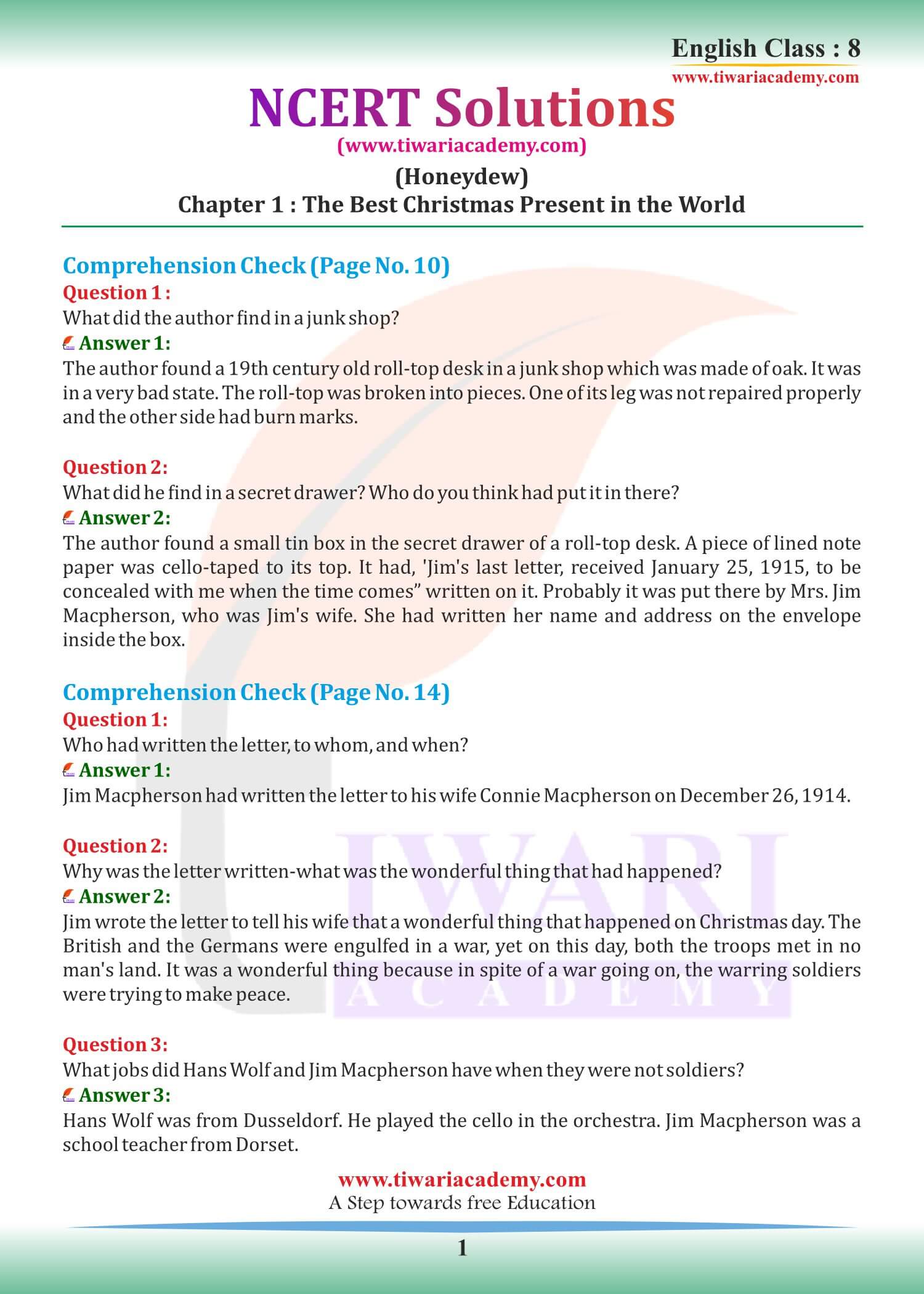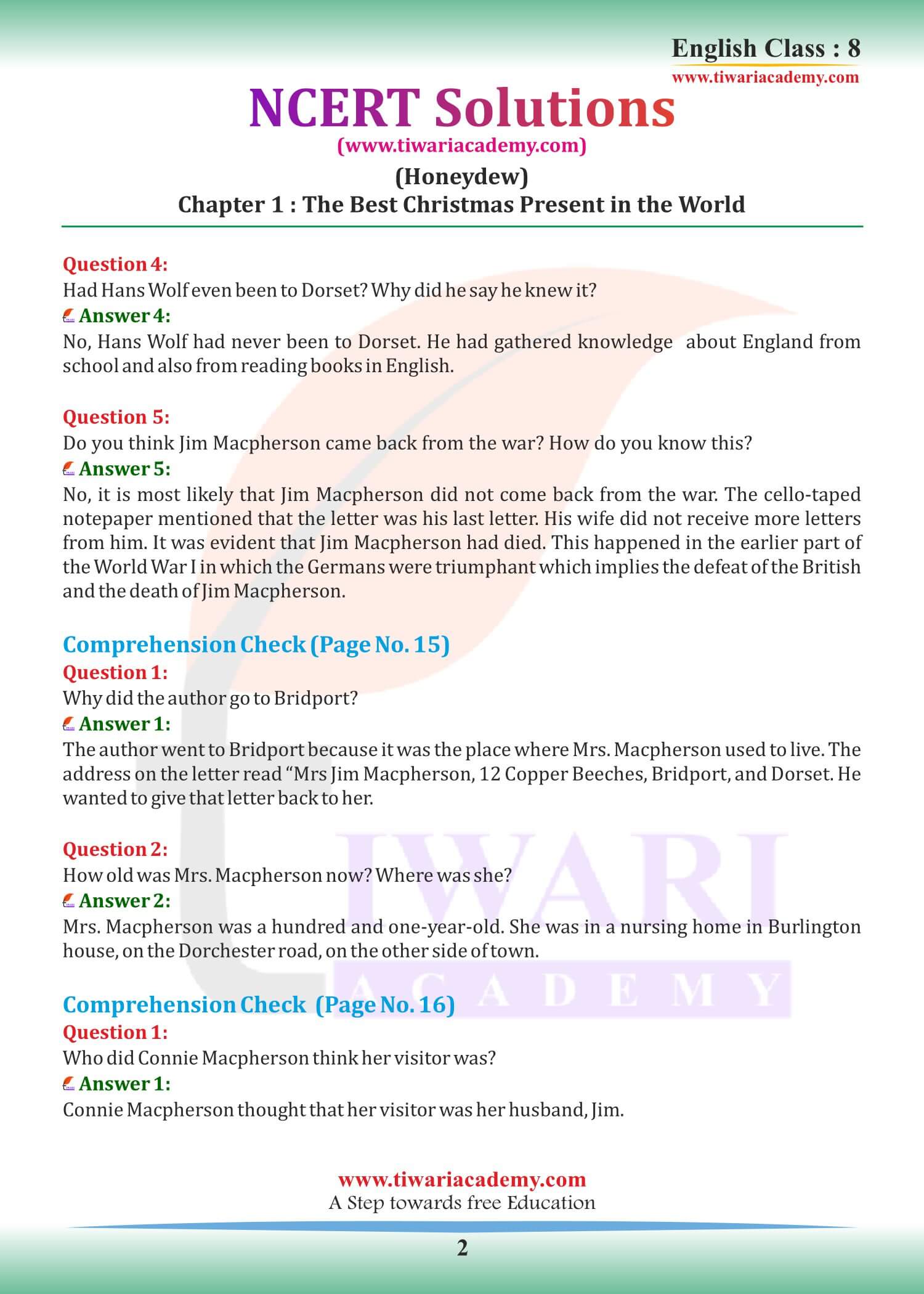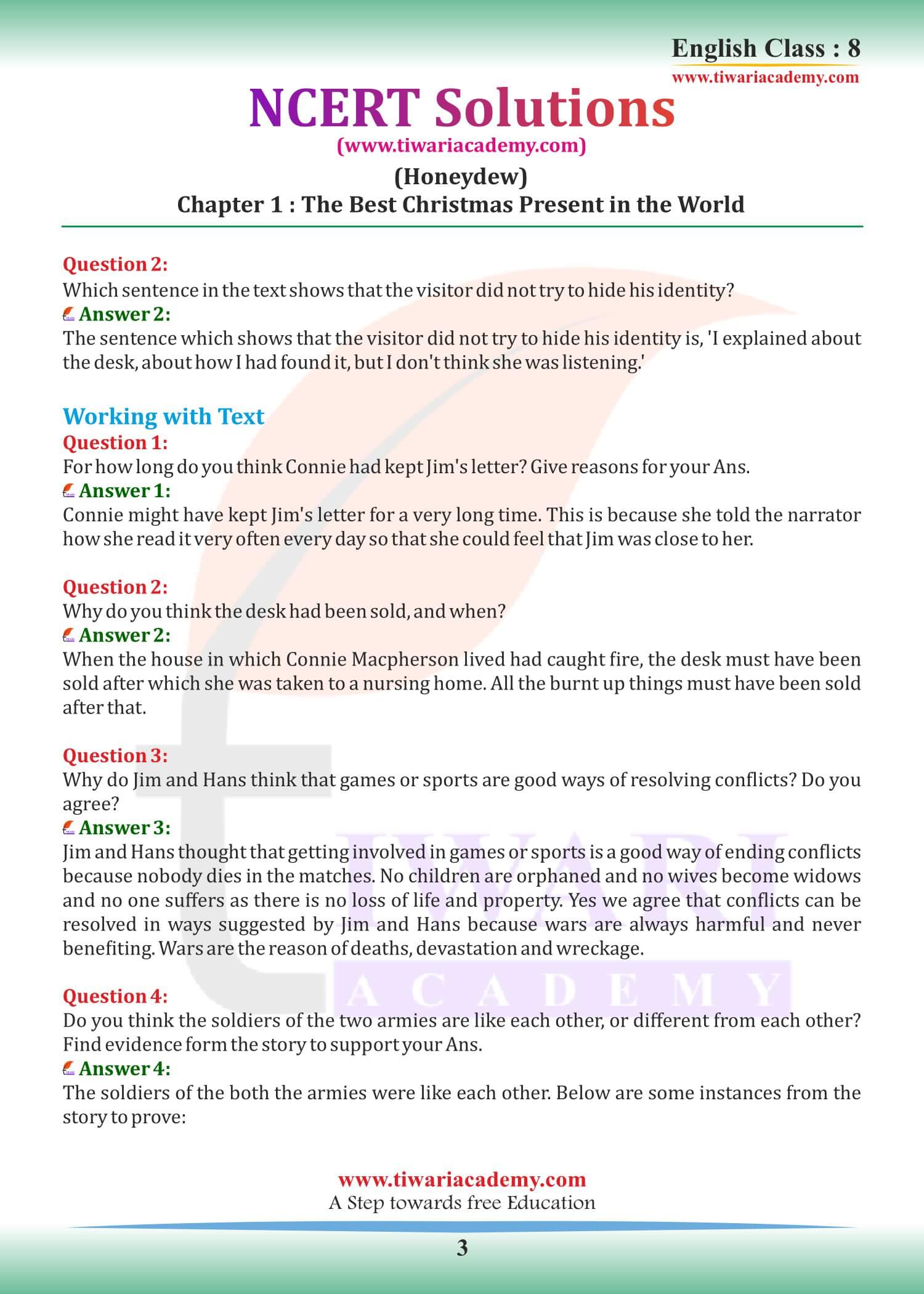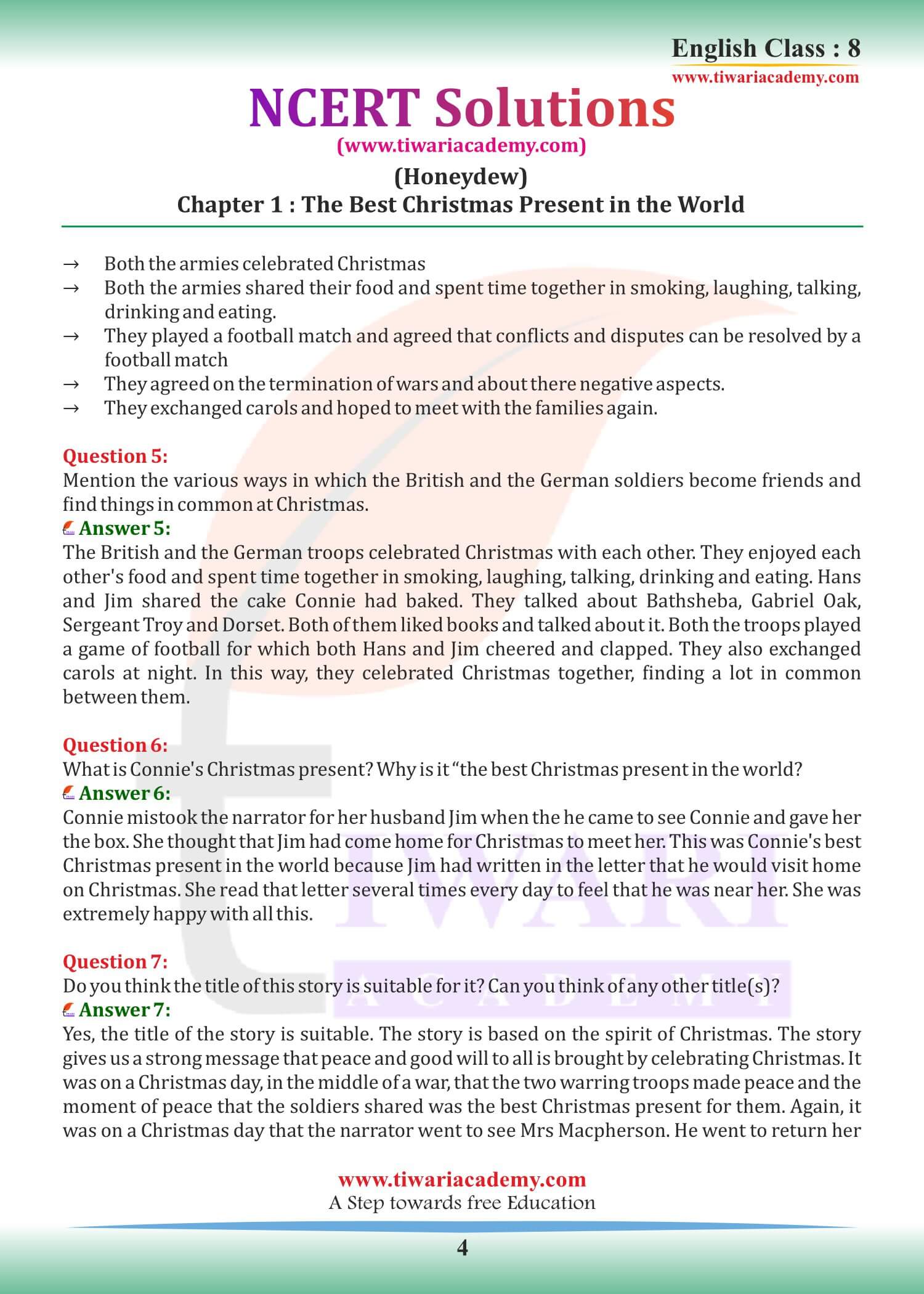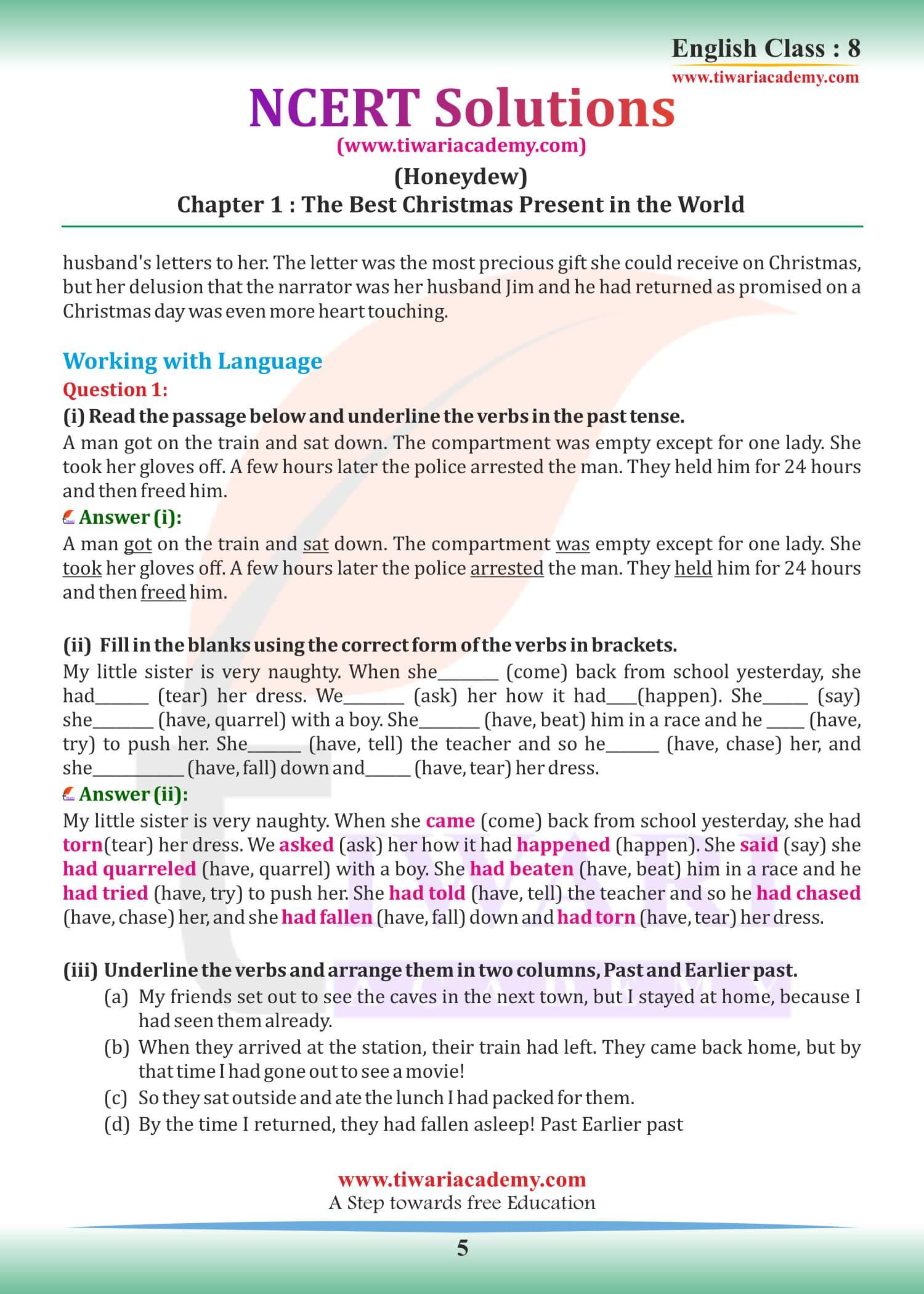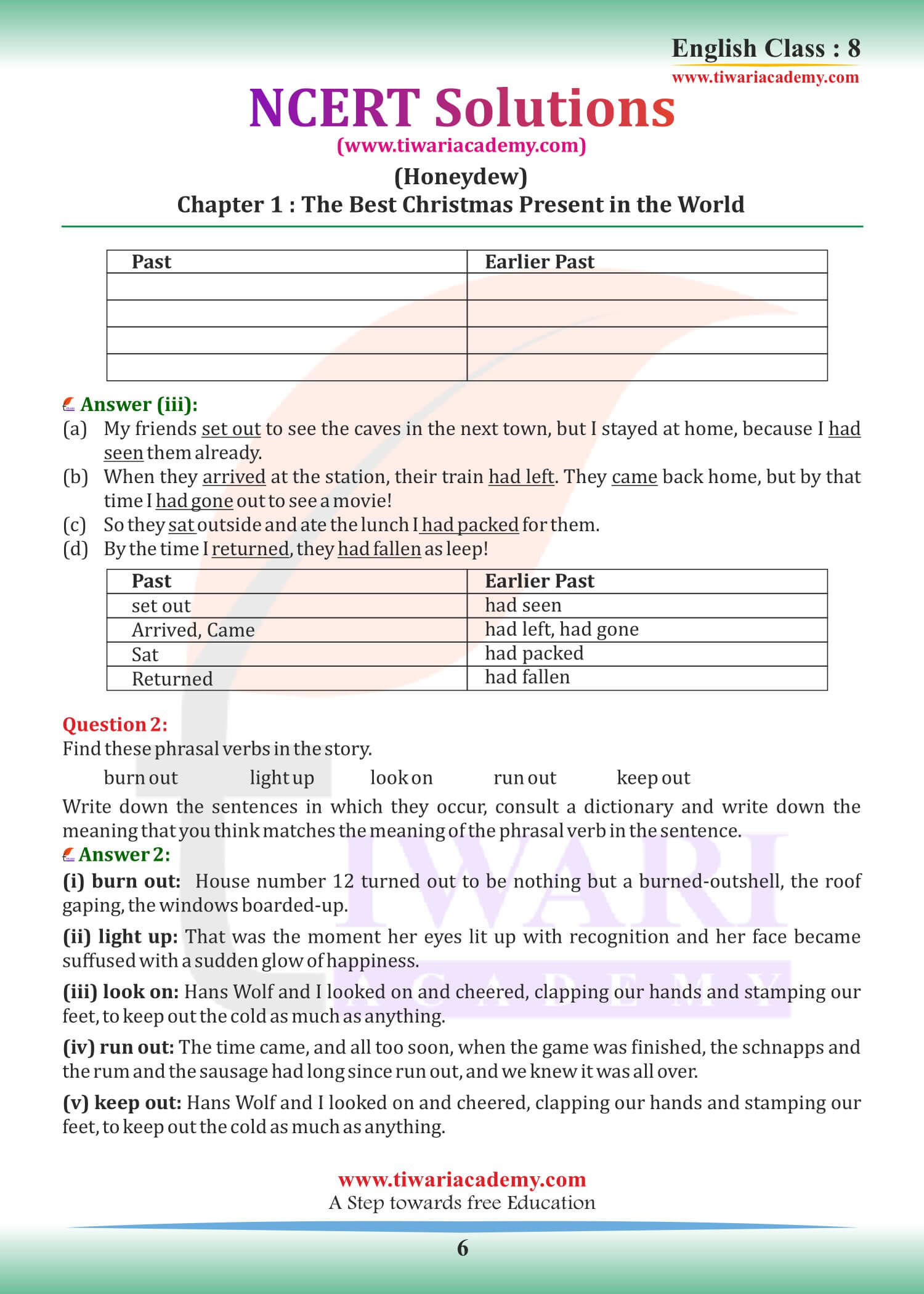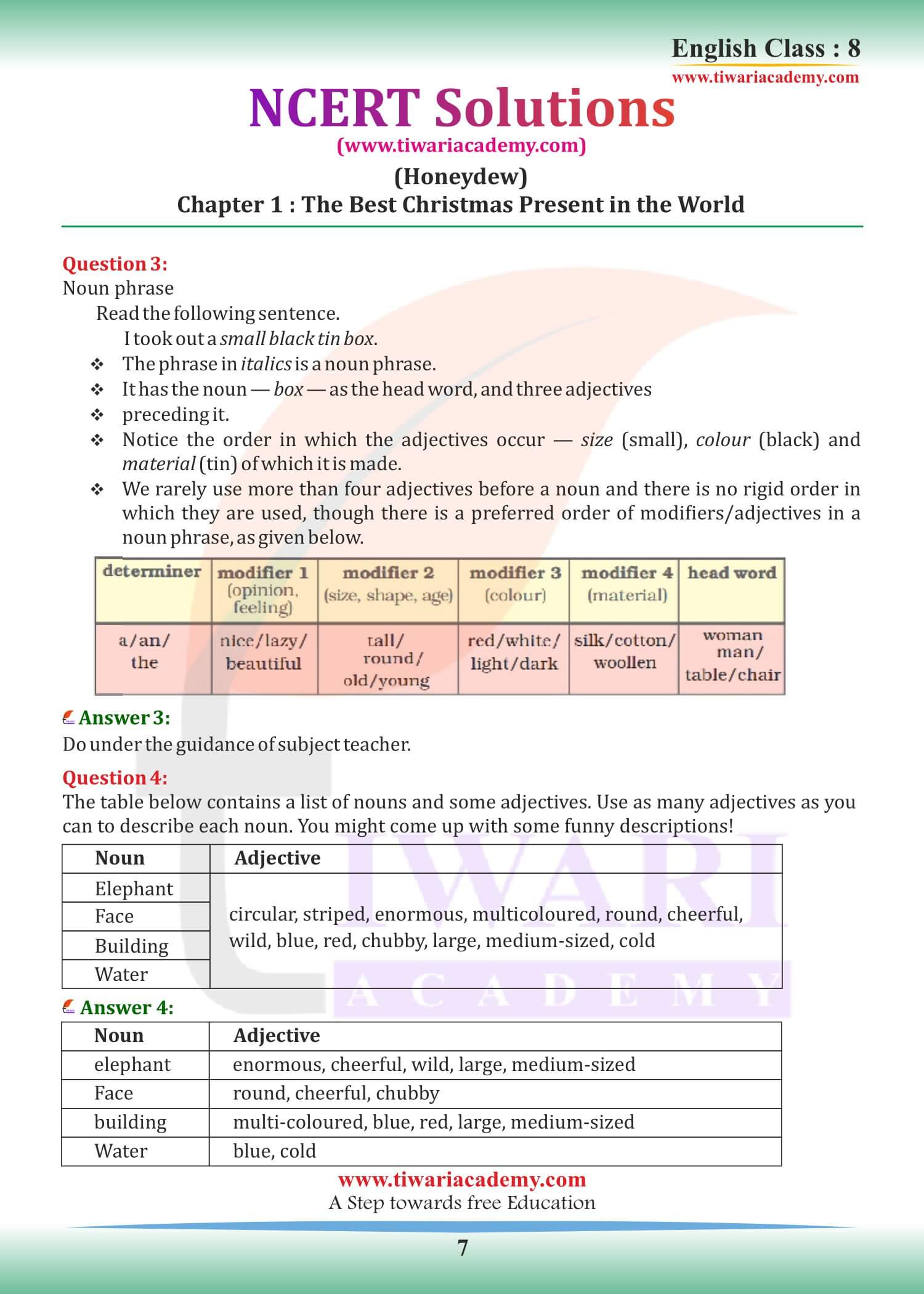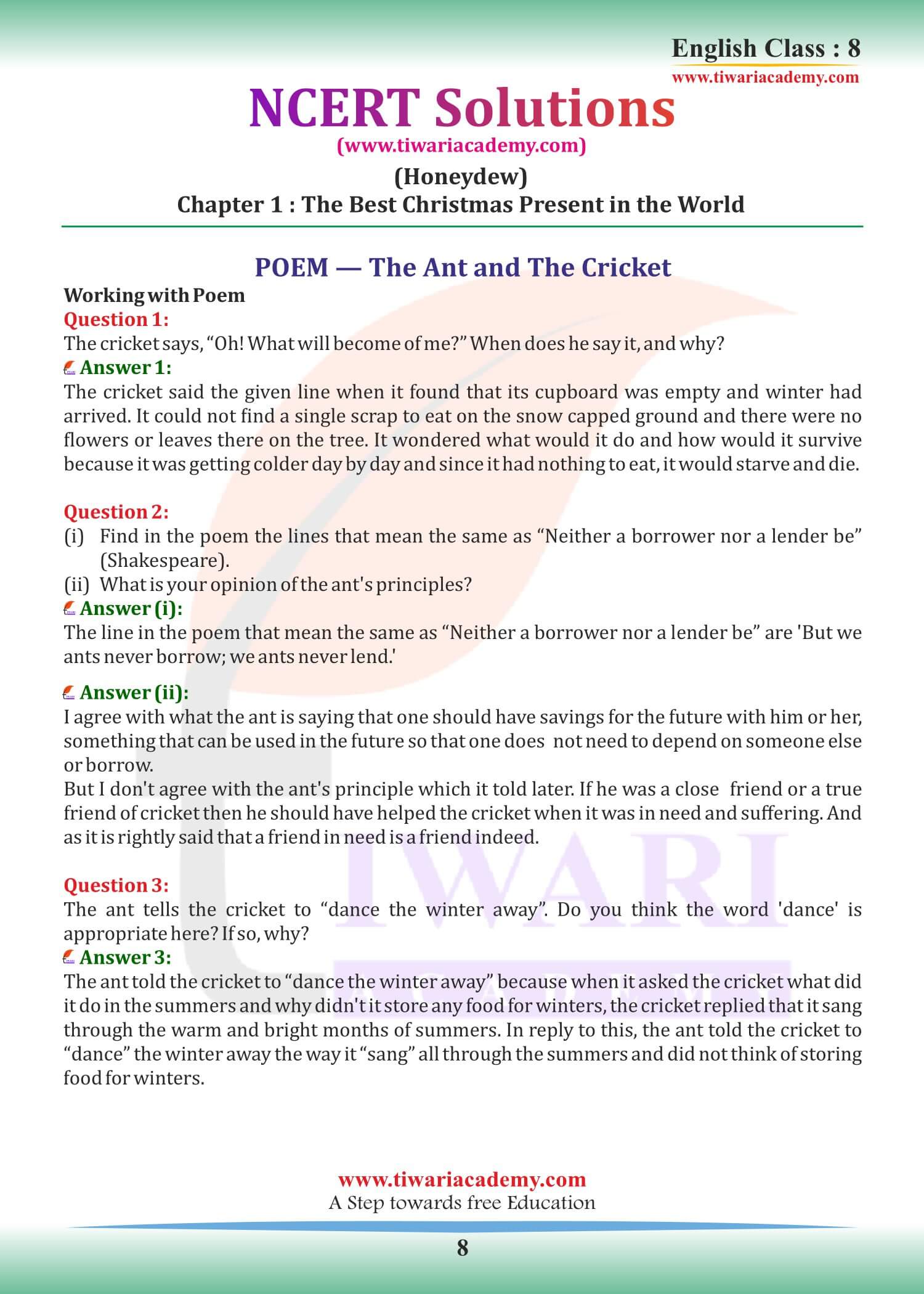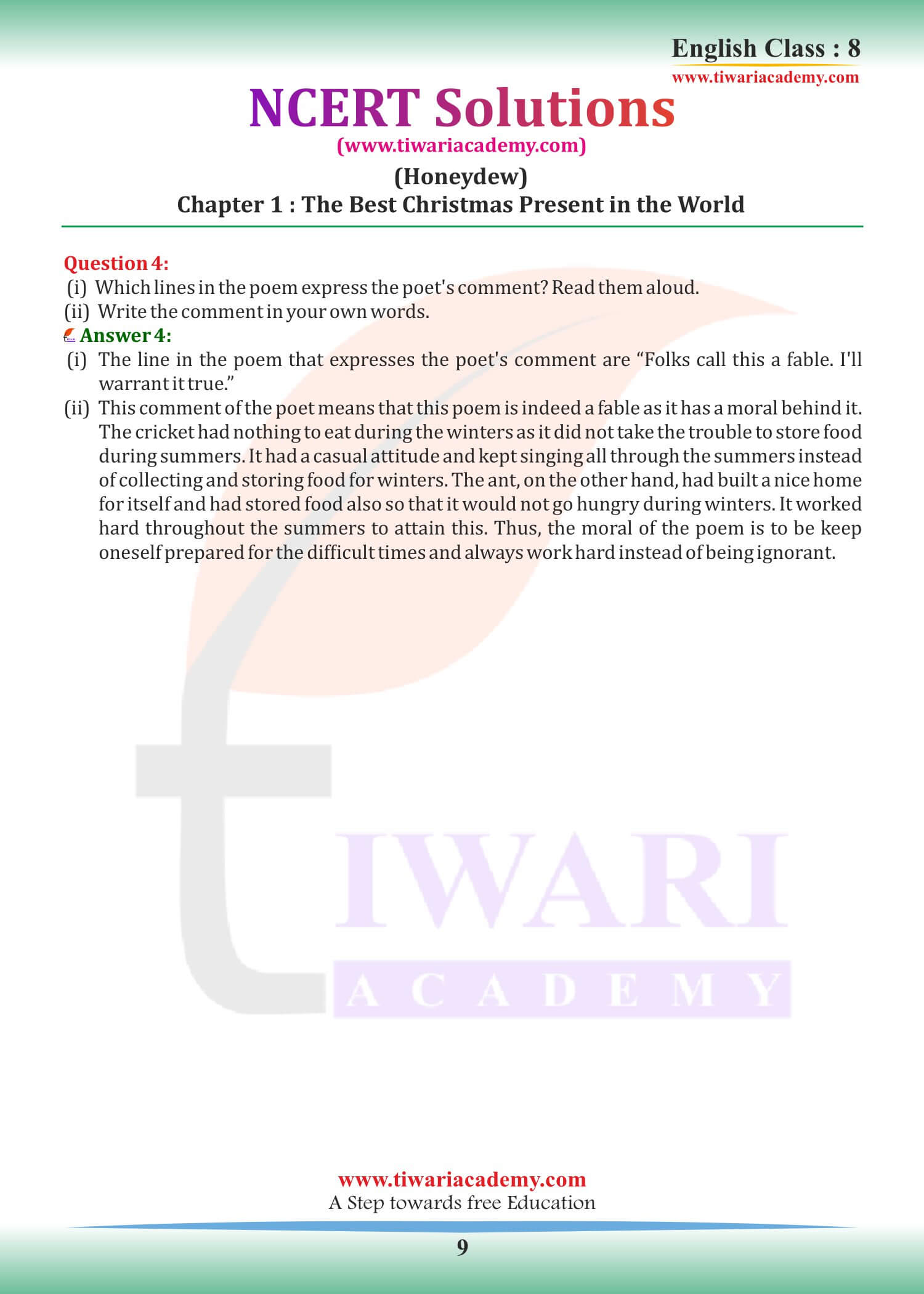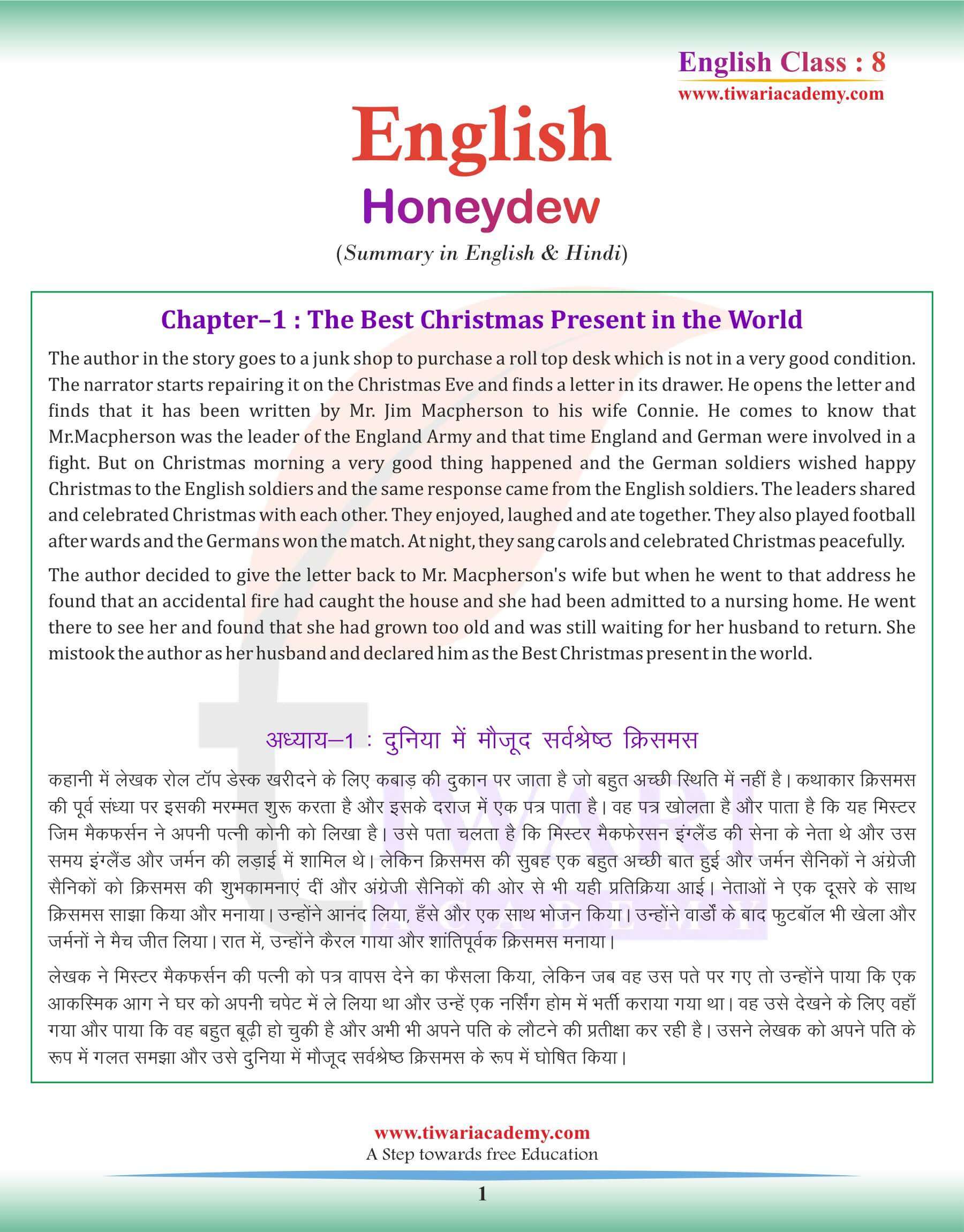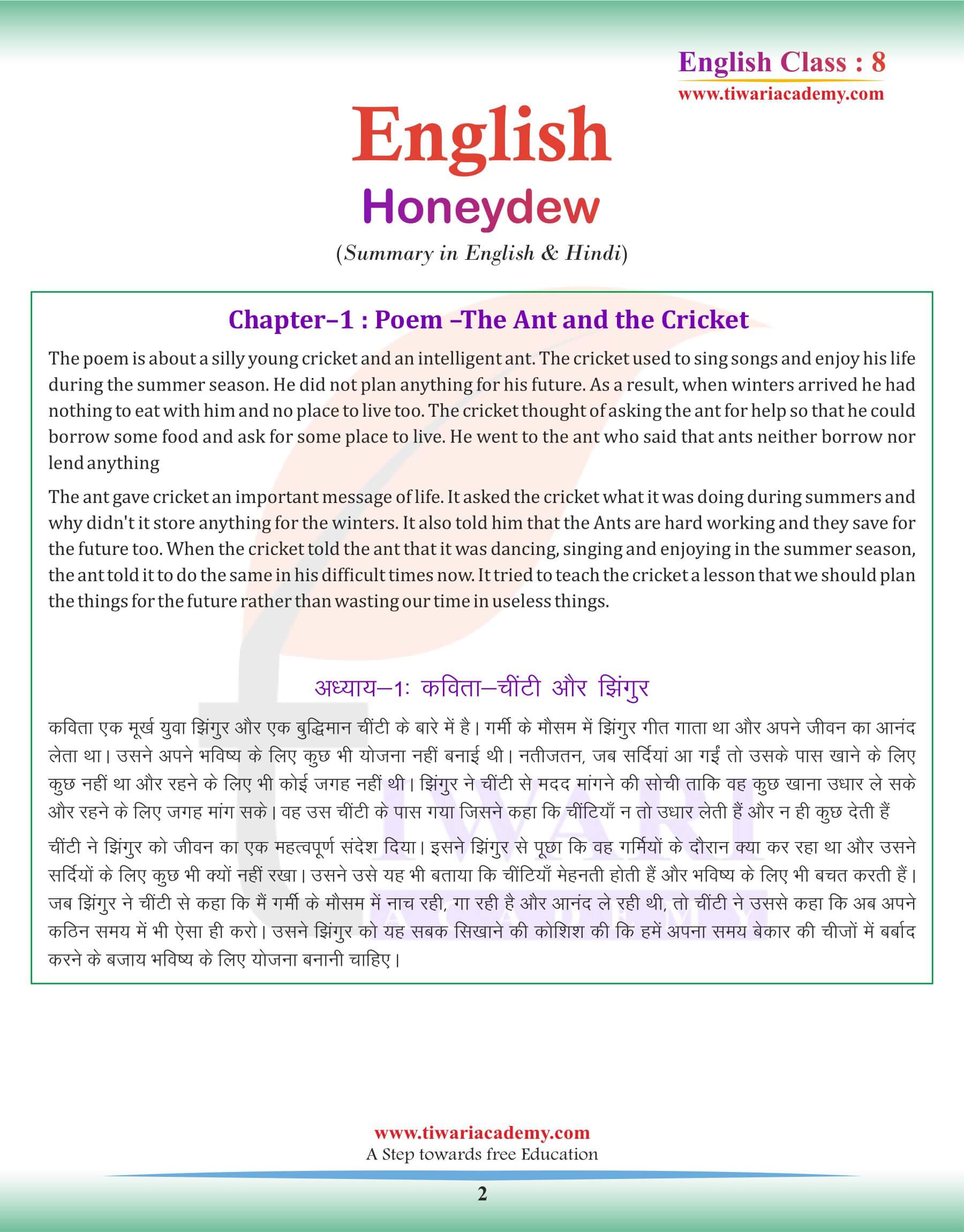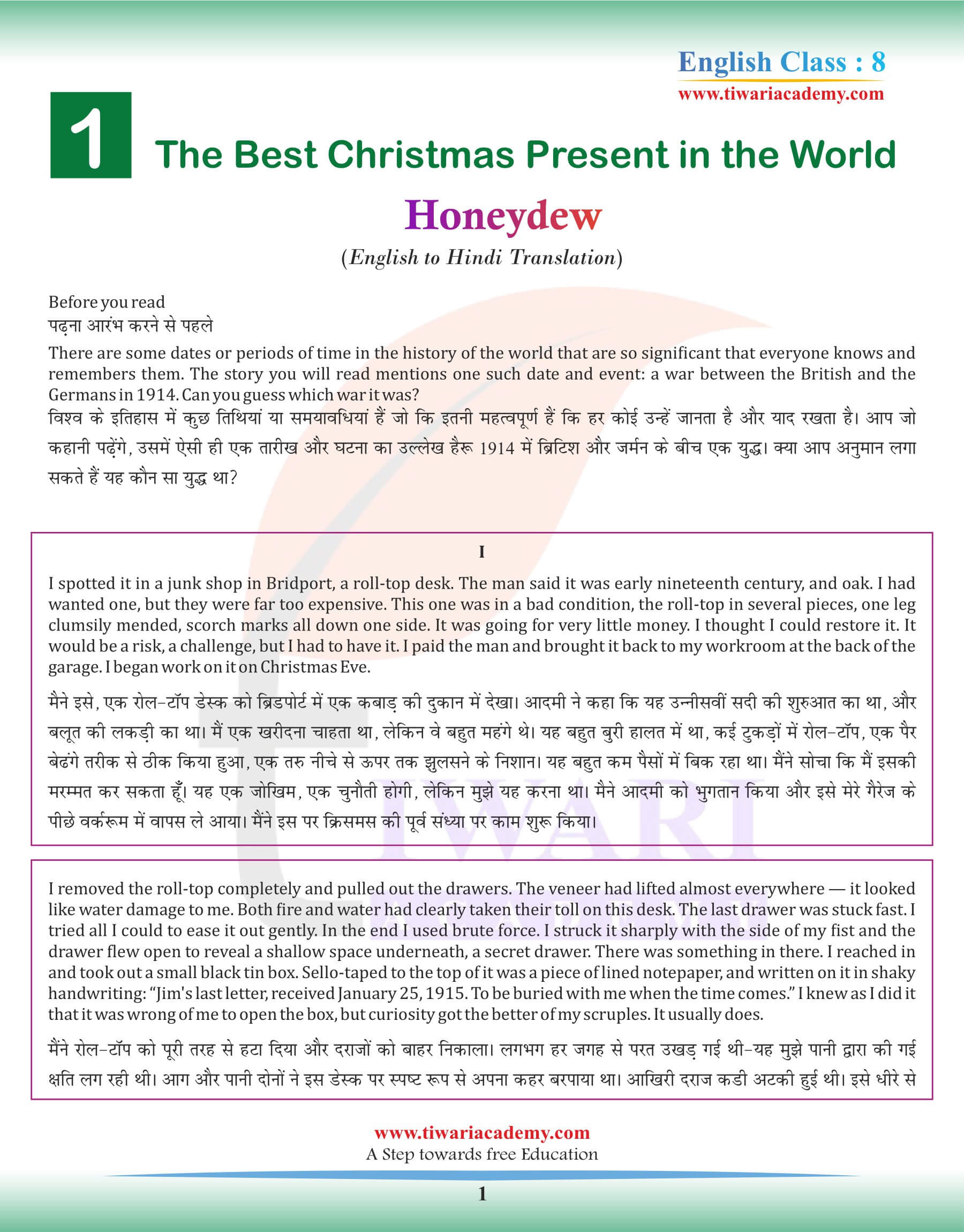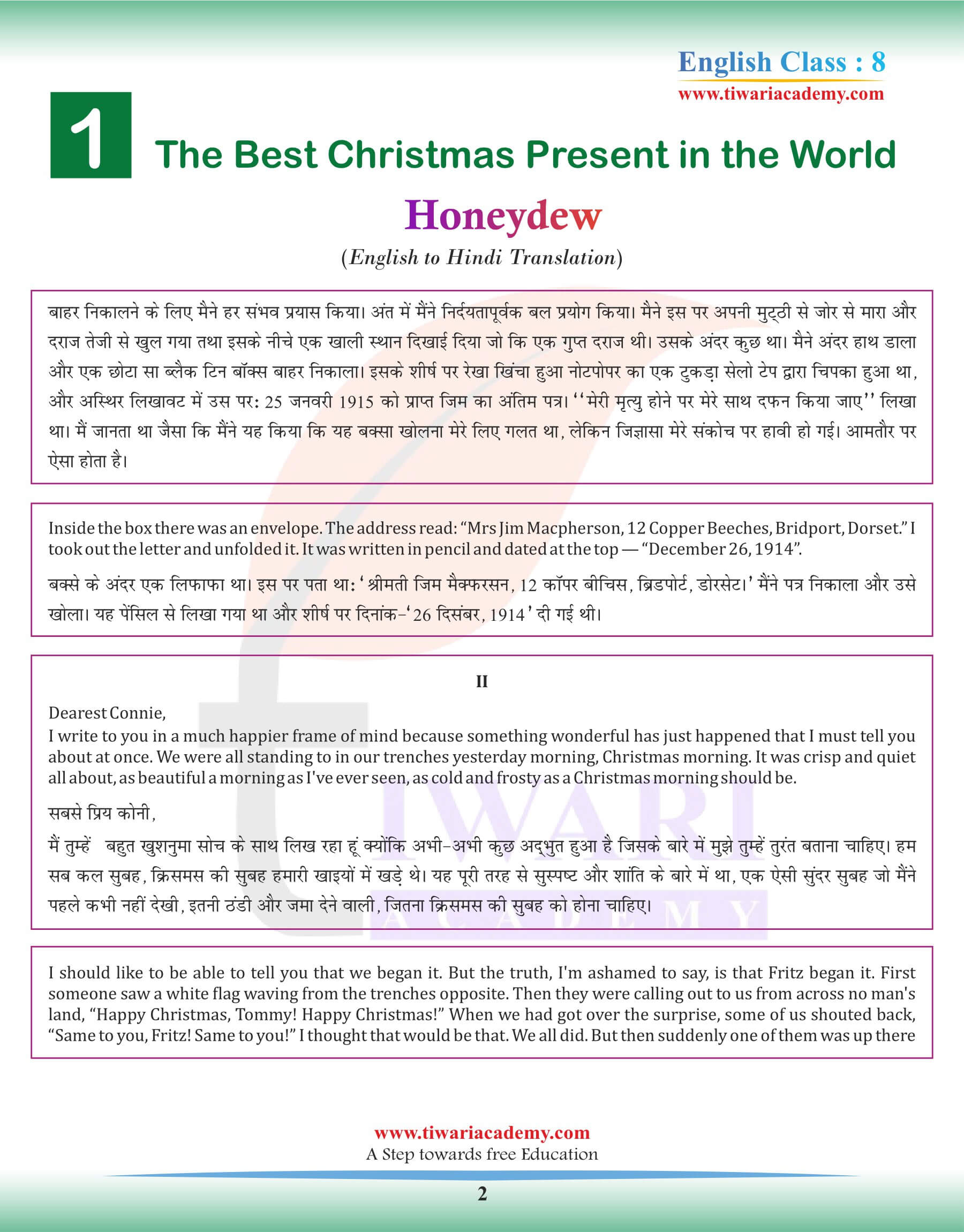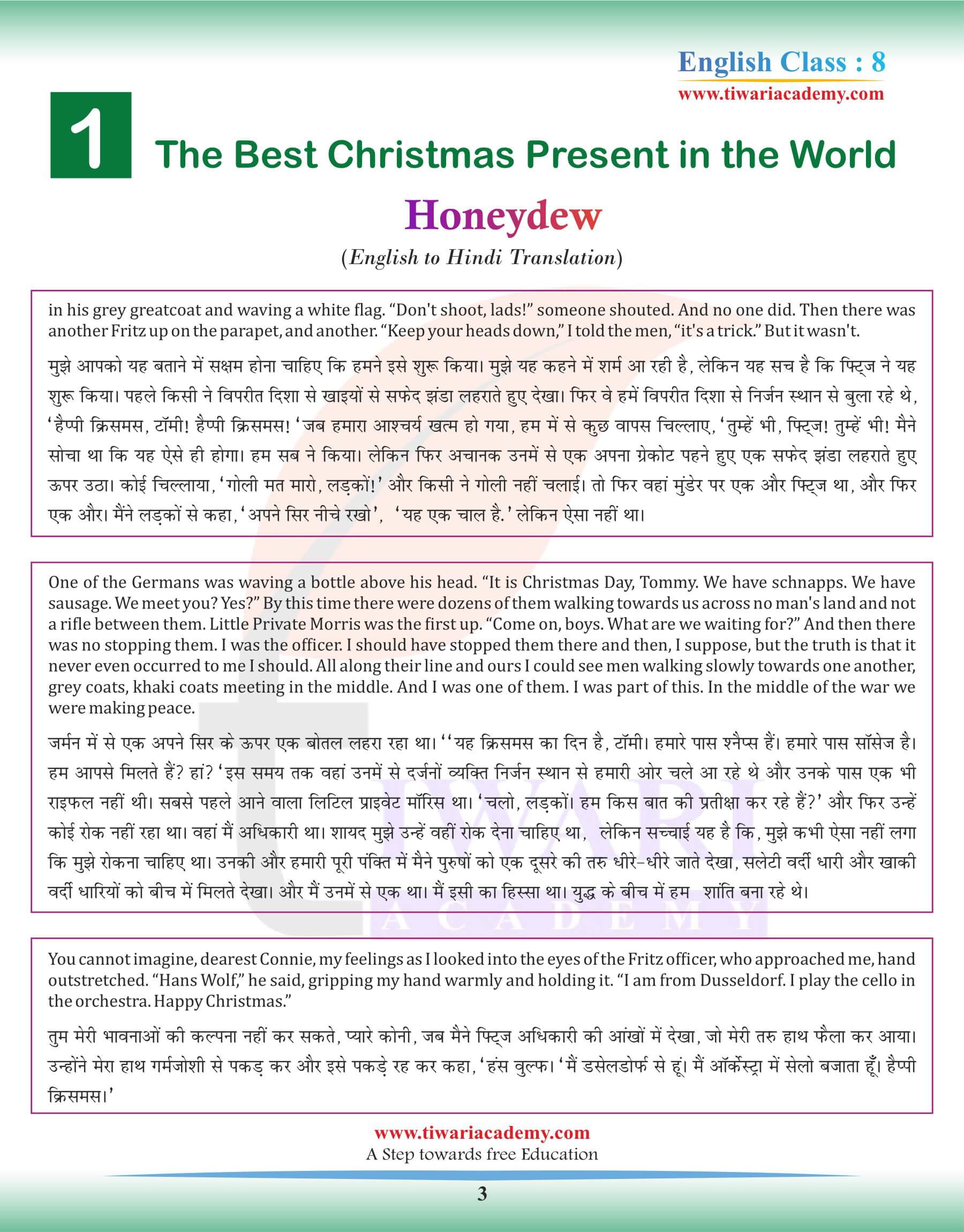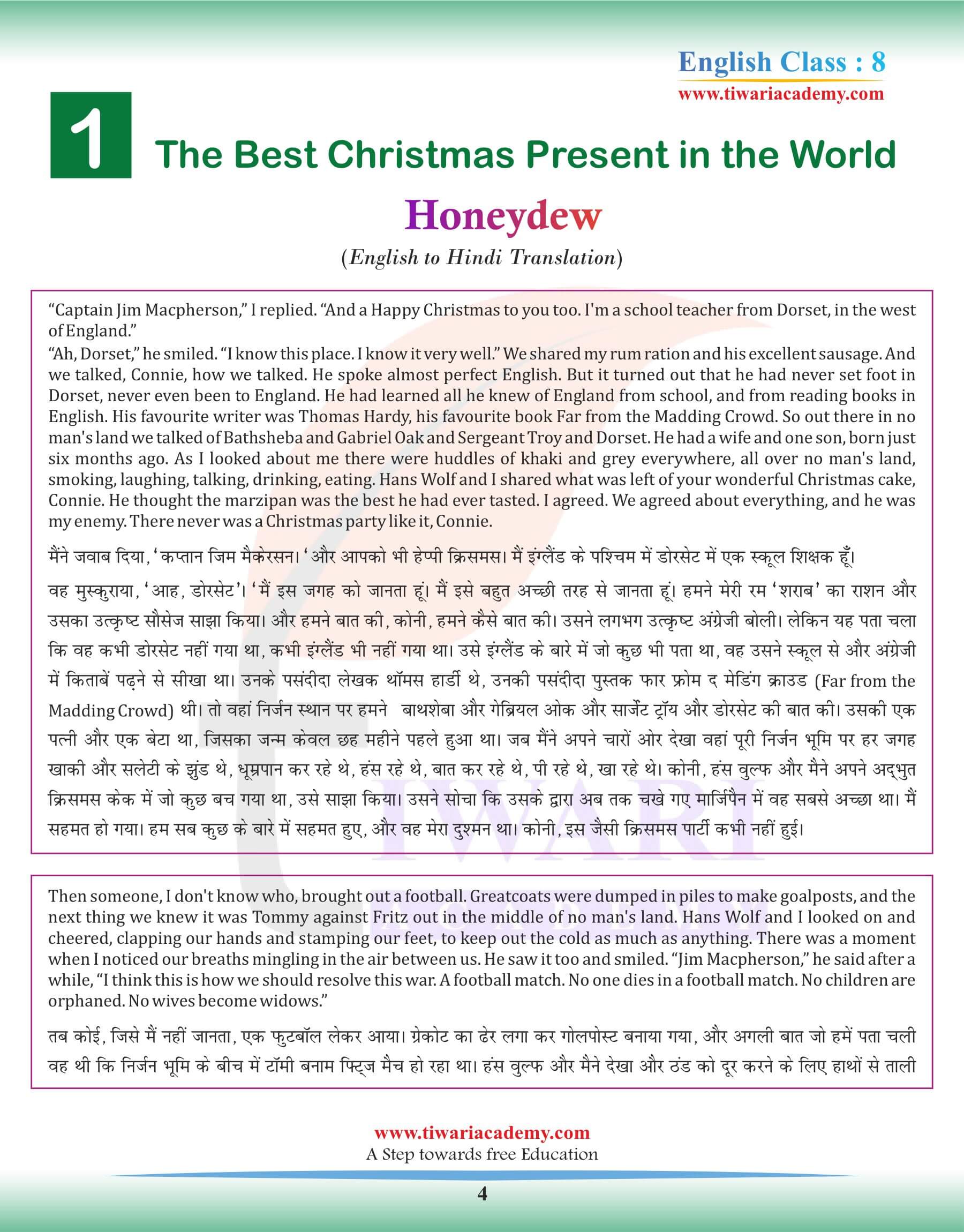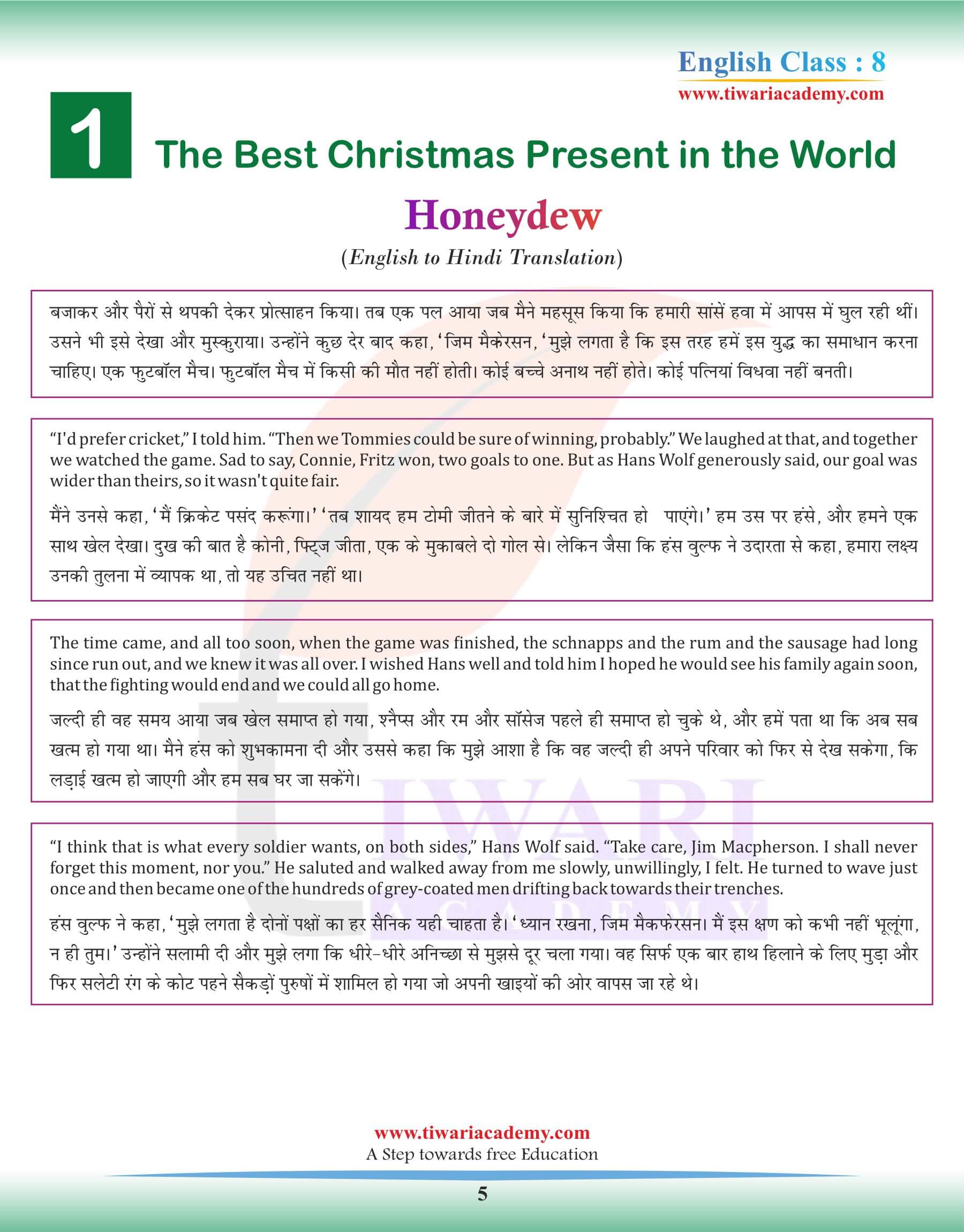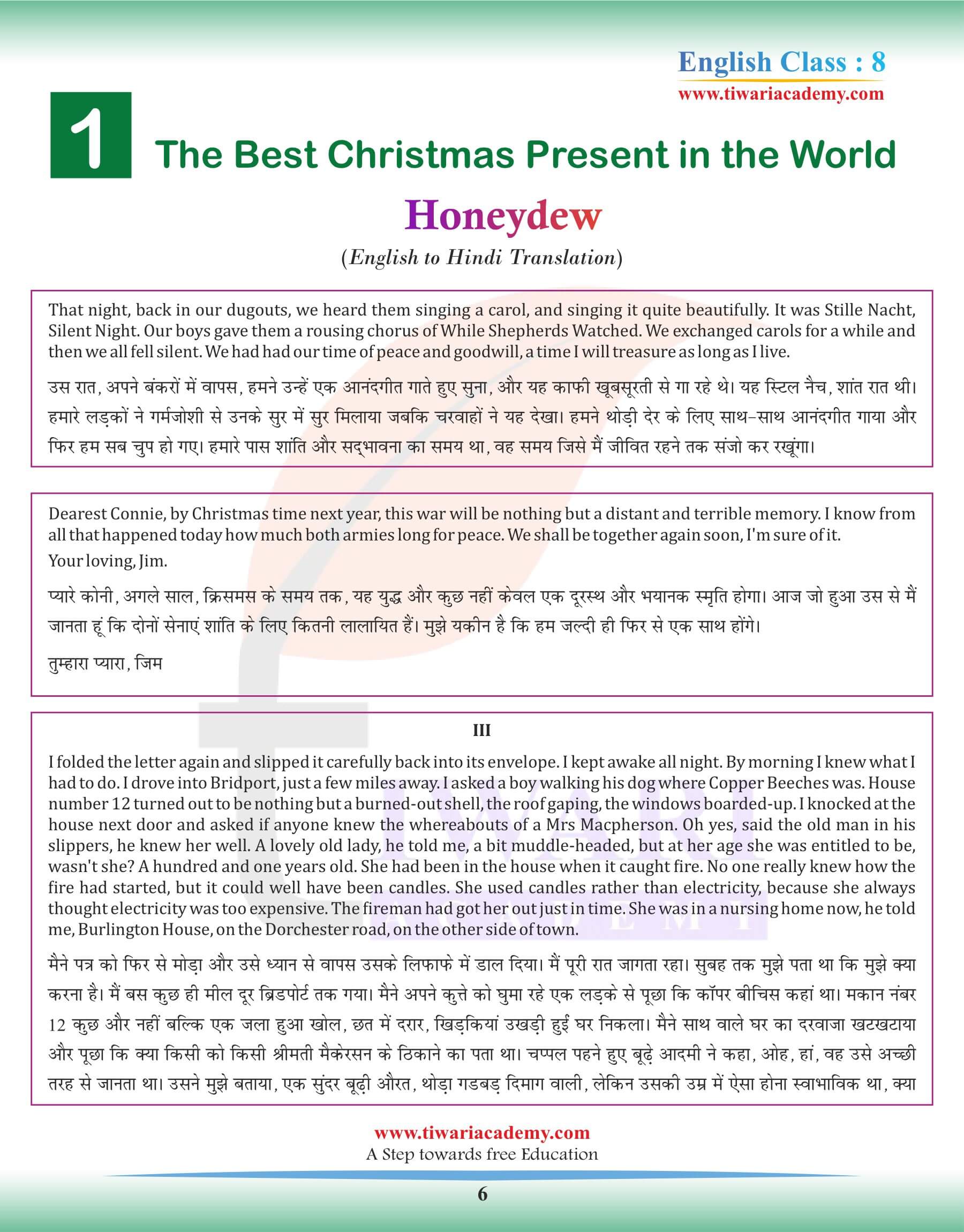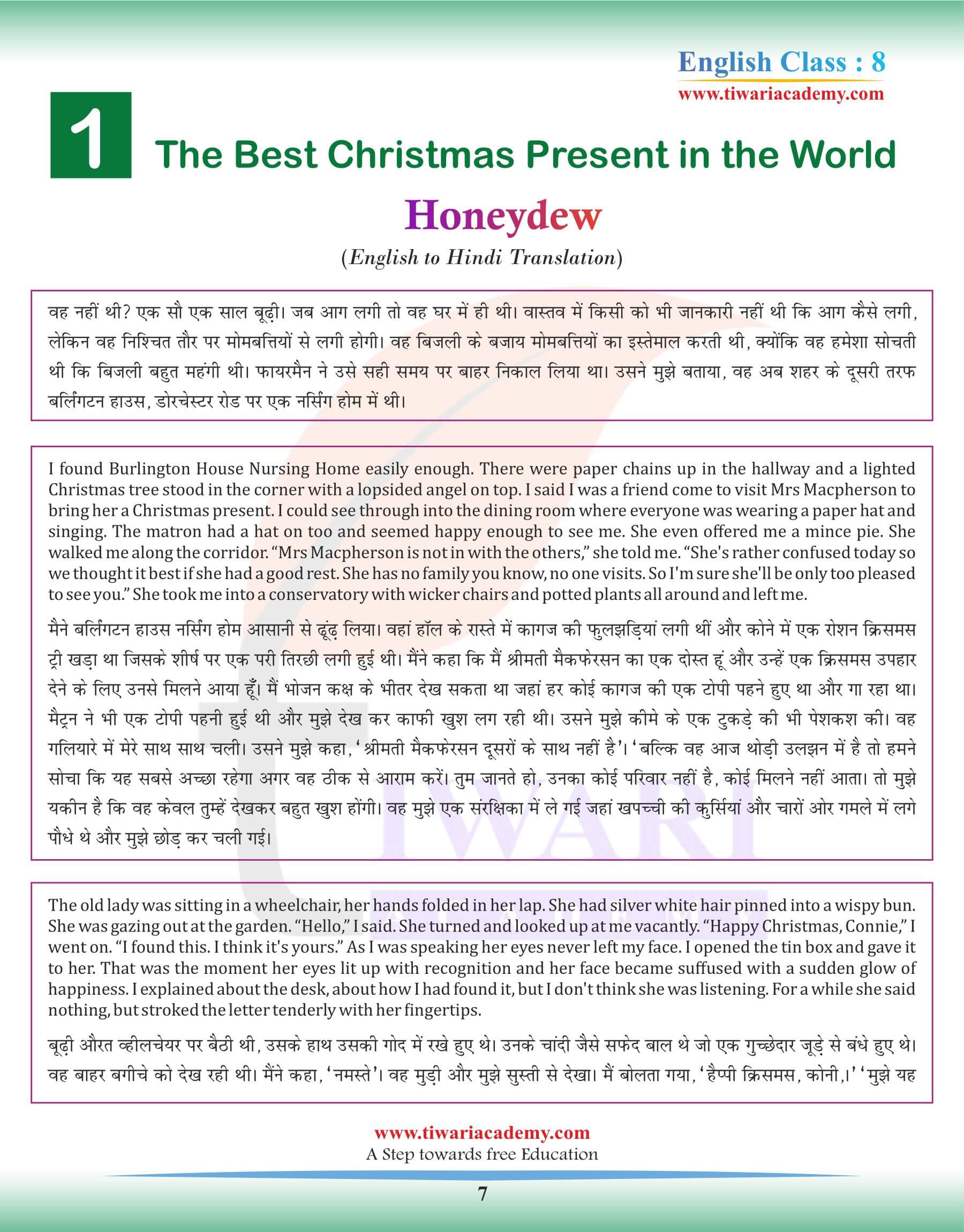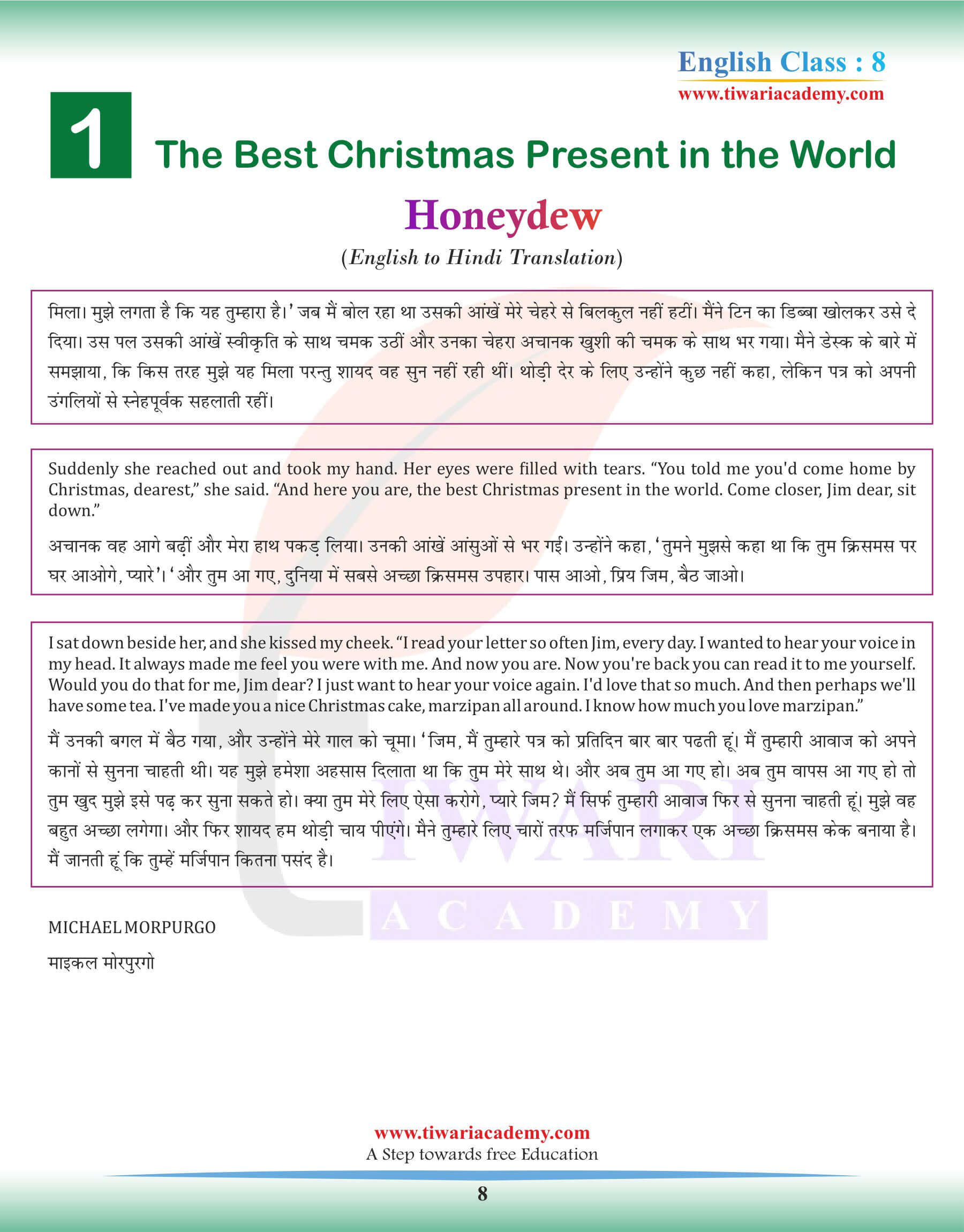NCERT Solutions for Class 8 English Honeydew Chapter 1 The Best Christmas Present in the World and the poem 1 The Ant and the Cricket with Hindi Translation, Summary in Hindi and English. Class 8 English Chapter 1 solutions covers all comprehension check and exercises question answers. It also includes working with text, working with language and other grammatical portion given at the end exercises revised according to new textbooks issued for 2025-26 exams.
Class 8 English Honeydew Chapter 1 Question Answers
| Class: 8 | English |
| Chapter: 1 | The Best Christmas Present in the World |
| Contents: | NCERT Solutions, Translation, Summary |
| Content Type: | Text, Images and Videos |
| Academic Session: | 2025-26 |
Comprehension Check on Page 10
The author found a 19th century old roll-top desk in a junk shop which was made of oak. It was in a very bad state. The roll-top was broken into pieces. One of its leg was not repaired properly and the other side had burn marks.
What did he find in a secret drawer? Who do you think had put it in there?
The author found a small tin box in the secret drawer of a roll-top desk. A piece of lined note paper was cello-taped to its top. It had, ‘Jim’s last letter, received January 25, 1915, to be concealed with me when the time comes” written on it. Probably it was put there by Mrs. Jim Macpherson, who was Jim’s wife. She had written her name and address on the envelope inside the box.
Comprehension Check on Page 14
Who had written the letter, to whom, and when?
Jim Macpherson had written the letter to his wife Connie Macpherson on December 26, 1914.
Why was the letter written-what was the wonderful thing that had happened?
Jim wrote the letter to tell his wife that a wonderful thing that happened on Christmas day. The British and the Germans were engulfed in a war, yet on this day, both the troops met in no man’s land. It was a wonderful thing because in spite of a war going on, the warring soldiers were trying to make peace.
What jobs did Hans Wolf and Jim Macpherson have when they were not soldiers?
Hans Wolf was from Dusseldorf. He played the cello in the orchestra. Jim Macpherson was a school teacher from Dorset.
Had Hans Wolf ever been to Dorset? Why did he say he knew it?
No, Hans Wolf had never been to Dorset. He had gathered knowledge about England from school and also from reading books in English.
Do you think Jim Macpherson came back from the war? How do you know this?
No, it is most likely that Jim Macpherson did not come back from the war. The cello-taped notepaper mentioned that the letter was his last letter. His wife did not receive more letters from him. It was evident that Jim Macpherson had died. This happened in the earlier part of the World War I in which the Germans were triumphant which implies the defeat of the British and the death of Jim Macpherson.
Comprehension Check on Page 15
The author went to Bridport because it was the place where Mrs. Macpherson used to live. The address on the letter read “Mrs Jim Macpherson, 12 Copper Beeches, Bridport, and Dorset. He wanted to give that letter back to her.
How old was Mrs Macpherson now? Where was she?
Mrs. Macpherson was a hundred and one-year-old. She was in a nursing home in Burlington house, on the Dorchester road, on the other side of town.
Comprehension Check on Page 16
Who did Connie Macpherson think her visitor was?
Connie Macpherson thought that her visitor was her husband, Jim.
Which sentence in the text shows that the visitor did not try to hide his identity?
The sentence which shows that the visitor did not try to hide his identity is, “I explained about the desk, about how I had found it, but I don’t think she was listening.”
Working with the Text
For how long do you think Connie had kept Jim’s letter? Give reasons for your Answer.
Connie might have kept Jim’s letter for a very long time. This is because she told the narrator how she read it very often every day so that she could feel that Jim was close to her.
Why do you think the desk had been sold, and when?
When the house in which Connie Macpherson lived had caught fire, the desk must have been sold after which she was taken to a nursing home. All the burnt up things must have been sold after that.
Why do Jim and Hans think that games or sports are good ways of resolving conflicts? Do you agree?
Jim and Hans thought that getting involved in games or sports is a good way of ending conflicts because nobody dies in the matches. No children are orphaned and no wives become widows and no one suffers as there is no loss of life and property.
Yes we agree that conflicts can be resolved in ways suggested by Jim and Hans because wars are always harmful and never benefiting. Wars are the reason of deaths, devastation and wreckage.
Do you think the soldiers of the two armies are like each other, or different from each other? Find evidence form the story to support your Answer.
The soldiers of the both the armies were like each other. Below are some instances from the story to prove:
1. Both the armies celebrated Christmas
2. Both the armies shared their food and spent time together in smoking, laughing, talking, drinking and eating.
3. They played a football match and agreed that conflicts and disputes can be resolved by a football match
4. They agreed on the termination of wars and about their negative aspects.
5. They exchanged carols and hoped to meet with the families again.
Mention the various ways in which the British and the German soldiers become friends and find things in common at Christmas.
The British and the German troops celebrated Christmas with each other. They enjoyed each other’s food and spent time together in smoking, laughing, talking, drinking and eating. Hans and Jim shared the cake Connie had baked. They talked about Bathsheba, Gabriel Oak, Sergeant Troy and Dorset. Both of them liked books and talked about it. Both the troops played a game of football for which both Hans and Jim cheered and clapped. They also exchanged carols at night. In this way, they celebrated Christmas together, finding a lot in common between them.
What is Connie’s Christmas present? Why is it “the best Christmas present in the world”?
Connie mistook the narrator for her husband Jim when the he came to see Connie and gave her the box. She thought that Jim had come home for Christmas to meet her. This was Connie’s best Christmas present in the world because Jim had written in the letter that he would visit home on Christmas. She read that letter several times every day to feel that he was near her. She was extremely happy with all this.
Do you think the title of this story is suitable for it? Can you think of any other title(s)?
Yes, the title of the story is suitable. The story is based on the spirit of Christmas. The story gives us a strong message that peace and good will to all is brought by celebrating Christmas. It was on a Christmas day, in the middle of a war, that the two warring troops made peace and the moment of peace that the soldiers shared was the best Christmas present for them. Again, it was on a Christmas day that the narrator went to see Mrs Macpherson. He went to return her husband’s letters to her. The letter was the most precious gift she could receive on Christmas, but her delusion that the narrator was her husband Jim and he had returned as promised on a Christmas day was even more heart touching.
Working with Languag
(i) Read the passage below and underline the verbs in the past tense.
A man got on the train and sat down. The compartment was empty except for one lady. She took her gloves off. A few hours later the police arrested the man. They held him for 24 hours and then freed him.
Answer: A man got on the train and sat down. The compartment was empty except for one lady. She took her gloves off. A few hours later the police arrested the man. They held him for 24 hours and then freed him.
(ii) Fill in the blanks using the correct form of the verbs in brackets.
My little sister is very naughty. When she________ (come) back from school yesterday, she had_______ (tear) her dress. We________ (ask) her how it had____(happen). She______ (say) she________ (have, quarrel) with a boy. She________ (have, beat) him in a race and he _____ (have, try) to push her. She_______ (have, tell) the teacher and so he_______ (have, chase) her, and she____________ (have, fall) down and______ (have, tear) her dress.
Answer
My little sister is very naughty. When she came (come) back from school yesterday, she had torn (tear) her dress. We asked (ask) her how it had happened (happen). She said (say) she had quarreled (have, quarrel) with a boy. She had beaten (have, beat) him in a race and he had tried (have, try) to push her. She had told (have, tell) the teacher and so he had chased (have, chase) her, and she had fallen (have, fall) down and had torn (have, tear) her dress.
(iii) Underline the verbs and arrange them in two columns, Past and Earlier past.
(a) My friends set out to see the caves in the next town, but I stayed at home, because I had seen them already.
(b) When they arrived at the station, their train had left. They came back home, but by that time I had gone out to see a movie!
(c) So they sat outside and ate the lunch I had packed for them.
(d) By the time I returned, they had fallen asleep!
| Past | Earlier past |
|---|---|
| set out | had seen |
| Stayed | had left |
| Arrived | had gone |
| Came | had packed |
| Sat | had fallen |
Find these phrasal verbs in the story.
burn out light up look on run out keep out
Write down the sentences in which they occur. Consult a dictionary and write down the meaning that you think matches the meaning of the phrasal verb in the sentence.
Answer
- burn out
House number 12 turned out to be nothing but a burned-outshell, the roof gaping, the windows boarded-up. - light up
That was the moment her eyes lit up with recognition and her face became suffused with a sudden glow of happiness. - look on
Hans Wolf and I looked on and cheered, clapping our hands and stamping our feet, to keep out the cold as much as anything. - run out
The time came, and all too soon, when the game was finished, the schnapps and the rum and the sausage had long since run out, and we knew it was all over. - keep out
Hans Wolf and I looked on and cheered, clapping our hands and stamping our feet, to keep out the cold as much as anything.
Working with the Poem
The cricket says, “Oh! What will become of me?” When does he say it, and why?
The cricket said the given line when it found that its cupboard was empty and winter had arrived. It could not find a single scrap to eat on the snow-capped ground and there were no flowers or leaves there on the tree. It wondered what would it do and how would it survive because it was getting colder day by day and since it had nothing to eat, it would starve and die.
Find in the poem the lines that mean the same as “Neither a borrower nor a lender be” (Shakespeare).
The line in the poem that mean the same as “Neither a borrower nor a lender be” are “But we ants never borrow; we ants never lend”.
What is your opinion of the ant’s principles?
I agree with what the ant is saying that one should have savings for the future with him or her, something that can be used in the future so that one does not need to depend on someone else or borrow.
But I don’t agree with the ant’s principle which it told later. If he was a close friend or a true friend of cricket, then he should have helped the cricket when it was in need and suffering. And as it is rightly said that a friend in need is a friend indeed.
The ant tells the cricket to “dance the winter away”. Do you think the word “dance” is appropriate here? If so, why?
The ant told the cricket to “dance the winter away” because when it asked the cricket what did it do in the summers and why didn’t it store any food for winters, the cricket replied that it sang through the warm and bright months of summers. In reply to this, the ant told the cricket to “dance” the winter away the way it “sang” all through the summers and did not think of storing food for winters.
Which lines in the poem express the poet’s comment? Read them aloud.
The line in the poem that expresses the poet’s comment are “Folks call this a fable. I’ll warrant it true.”
Write the comment in your own words.
This comment of the poet means that this poem is indeed a fable as it has a moral behind it. The cricket had nothing to eat during the winters as it did not take the trouble to store food during summers. It had a casual attitude and kept singing all through the summers instead of collecting and storing food for winters. The ant, on the other hand, had built a nice home for itself and had stored food also so that it would not go hungry during winters. It worked hard throughout the summers to attain this. Thus, the moral of the poem is to be keep oneself prepared for the difficult times and always work hard instead of being ignorant.
Reference to Context 1
I removed the roll-top completely and pulled out the drawers. The veneer had lifted almost everywhere it looked like water damage to me. Both fire and water had taken their toll on this desk. The last drawer was stuck fast. I tried all I could to ease it out gently. In the end, I used brute force. I struck it sharply with the side of my fist and the drawer flew open to reveal a shallow space underneath, a secret drawer.
Answer the following Questions:
- Who is I in the above passage?
- What does ‘It’ denote in the above lines?
- What was the condition of the desk?
- Where did he find a secret drawer?
- Find out the word/ phrase that means the same for the given word.
Reference to Context 2
I should like to be able to tell you that we began it. But the truth, I’m ashamed to say, is that Fritz began it. First, someone saw a white flag waving from the trenches opposite. Then they were calling out to us from across no man’s land, “Happy Christmas, Tommy! Happy Christmas!” When we had got over the surprise, some of us shouted back, “Same to you, Fritz! Same to you!” I thought that would be that. We all did. But then suddenly one of them was up there in his grey greatcoat and waving a white flag. “Don’t shoot, lads!” Someone shouted. And no one did. Then there was another Fritz up on the parapet, and another. “Keep your heads down,” I told the men, “it’s a trick.” But it wasn’t.
Answer the following Questions:
- What did the writer mean by ‘we began it’?
- What was the symbolic meaning of ‘a white flag5?
- Where were the soldiers sitting?
- What did the German soldiers wish them?
- Why did they call each other ‘Fritz’ and ‘Tommy’?
Reference to Context 3
“Captain Jim Macpherson,” I replied. “And a Happy Christmas to you too. I’m a school teacher from Dorset, in the west of England.” “Ah, Dorset,” he smiled. “I know this place. I know it very well.” We shared my rum ration and his excellent sausage. And we talked, Connie, how we talked. He spoke almost perfect English. But it turned out that he had never set foot in Dorset, never even been to England. He had learned all he knew of England from school, and from reading books in English. His favorite writer was Thomas Hardy, his favorite book Far from the Madding Crowd. So out there in no man’s land, we talked of Bathsheba and Gabriel Oak and Sergeant Troy and Dorset. He had a wife and one son, born just six months ago.
Answer the following Questions:
- What did the captain tell about himself?
- What did they share with the enemy soldiers?
- What was unusual about Connie?
- What did Hans Wolf tell about his family?
- Give the meaning of the following: (a) Turned out (b) excellent
Reference to Context 4
The old lady was sitting in a wheelchair, her hands folded in her lap. She had silver-white hair pinned into a wispy bun. She was gazing out at the garden. “Hello,” I said. She turned and looked up at me vacantly. “Happy Christmas, Connie,” I went on. “I found this. I think it’s yours.” As I was speaking her eyes never left my face. I opened the tin box and gave it to her. That was the moment her eyes lit up with recognition and her face became suffused with a sudden glow of happiness. I explained about the desk, about how I had found it, but I don’t think she was listening. For a while, she said nothing but stroked the letter tenderly with her fingertips.
Answer the following Questions:
- Who was the old lady sitting in a wheelchair?
- What made her eyes lit up?
- What wasn’t she listening to?
- Explain “suffused with”.
- Change the adjective tender into an adverb.
Answers of Reference to Context
Answers of Reference to Context 1
1. I is the narrator in the above passage.
2. ‘It’ denotes a roll-top desk.
3. The desk was damaged with water and fire.
4. He found the secret drawer underneath the last drawer which was stuck up badly.
5. Freedom from pain – ease out of little depth – shallow.
Answers of Reference to Context 2
1. German soldiers and wished them initiated treaty on Christmas. The writer was feeling ashamed because he wished that he must have started it.
2. The white flag is a symbol of peace.
3. The soldiers were sitting in the trenches.
4. The German soldiers wished them ‘Happy Christmas’.
5. ‘Fritz’ means a name for a German soldier while ‘Tommy’ means a common name for British soldiers.
Answers of Reference to Context 3
1. Captain introduced himself by revealing that he was a school teacher from Dorset in the west of England.
2. They shared mm ration and excellent sausage with the enemy soldiers.
3.Captain Jim realized that Connie could speak good English although he never went to England. He learned all from reading books in English.
4. Hans Wolf told me that he had a wife and six-month-old son.
5. (a) Turned out means ‘to develop or end in a particular way’. (b) very good.
Answers of Reference to Context 4
1. The old lady, sitting in a wheelchair was Mrs. Macpherson.
2. Connie could not recognize. Her eyes were lit up with recognition. Her face became suffused with a sudden glow of happiness.
3. Mrs. Macpherson was not listening to what he was telling her.
4. ‘Suffused with’ is a glow of happiness that spread over the face of Connie who was too old and weak. She mistook him to be her husband and smiled.
5. Tenderly.
What about the story that you like the most in chapter 1 from 8th Honeydew?
I think the author showed beautifully every part of the story, How bitter the War was and during that time all soldiers wanted it to be ended soon. One soldier took the initiative and raised the white flag and made Christmas night memorable and then the author gave the letter he found to Connie. Even though Connie thought it was Jim and talking him like him author didn’t break her trust over Jim by telling him his name.
Is the chapter 1 from class 8th honeydew is take much time to study?
This story was long but the author tried to provide the best details of the story in minimum words. This story author how he found the letter and Jim’s War Christmas experience and Connie’s wait were important details that he skillfully shared.
Do you think the cricket in the fable was haphazard in chapter 1 of class 8th honeydew?
Yes, I think the nature of cricket is completely carefree and full of randomness, Characterized by a lack of order or planning. That is why in winters when Ants have supplies to sustain the winter cricket doesn’t have anything.
